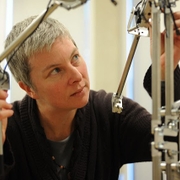- Level Foundation
- المدة 11 ساعات hours
- الطبع بواسطة The University of Edinburgh
-
Offered by

عن
What is the origin of our universe? What are dark matter and dark energy? This is the first part of the course 'Philosophy and the Sciences', dedicated to Philosophy of the Physical Sciences. Scientific research across the physical sciences has raised pressing questions for philosophers. The goal of this course is to introduce you to some of the main areas and topics at the key juncture between philosophy and the physical sciences. Each week we will introduce you to some of these important questions at the forefront of scientific research. We will explain the science behind each topic in a simple, non-technical way, while also addressing the philosophical and conceptual questions arising from it. We’ll consider questions about the origin and evolution of our universe, the nature of dark energy and dark matter and the role of anthropic reasoning in the explanation of our universe. Learning Objectives Gain a fairly well-rounded view on selected areas and topics at the intersection of philosophy and the sciences Understand some key questions, and conceptual problems arising in the natural sciences. Develop critical skills to evaluate and assess these problems. Suggested Reading To accompany 'Philosophy and the Sciences', we are pleased to announce a tie-in book from Routledge entitled 'Philosophy and the Sciences for Everyone'. This course companion to the 'Philosophy and the Sciences' course was written by the Edinburgh Philosophy and the Sciences team expressly with the needs of MOOC students in mind. 'Philosophy and the Sciences for Everyone' contains clear and user-friendly chapters, chapter summaries, glossary, study questions, suggestions for further reading and guides to online resources. Please note, this companion book is optional - all the resources needed to complete the course are available freely and listed on the course site.الوحدات
In this Introductory session, we introduce you to the broad field of 'philosophy of science' and clarify some of the central questions that philosophers ask about science. In particular, we briefly review the nature of scientific knowledge and debate
3
Videos
- 1.1 Intro
- 1.2 What is Science?
- 1.3 Duhem & Kuhn
1
Readings
- Lecture slides
Week 1 Quiz
1
Assignment
- Week 1 Practice Quiz: What is this thing called science?
Additional reading
1
Discussions
- Scientific Realism
5
Readings
- Recommendation for reading
- Epistemic relativism
- Inductivism and Falsificationism
- Underdetermination
- Philosophers
@Edinburgh
1
Readings
- Related work by Philosophy staff at the University of Edinburgh
In this class, we take you through the history of contemporary cosmology and we look at how scientists arrived at the current understanding of our universe. We look at the history of astronomy, with the nebular hypothesis back in the eighteenth centu
5
Videos
- 2.1 The origins of our universe
- 2.2 A Very Brief History of Cosmology part I
- 2.2 A Very Brief History of Cosmology part II
- 2.3 Cosmology & Scientific Methodology
- 2.4 Conclusion
1
Readings
- Lecture slides
Week 2 Quiz
1
Assignment
- Week 2 Quiz: The origins of the universe
Additional readings
1
Discussions
- Popper and Cosmology
5
Readings
- Recommendation for reading
- General overview of modern cosmology
- Unobservability and indistinguishable spacetimes
- Smolin on cosmology, time and laws
- Chris Smeenk
@Edinburgh
1
Readings
- Related work by Philosophy staff at the University of Edinburgh
In this class, we take you through a fascinating journey at the frontiers of contemporary cosmology and particle physics. We also look at alternative theories that explain the same experimental evidence without recourse to the hypothesis of dark mat
5
Videos
- 3.1 Introduction
- 3.2 Dark Matter & Dark Energy part I
- 3.2 Dark Matter & Dark Energy part II
- 3.3 What prospects for Cosmology?
- 3.4 Conclusion
2
Readings
- Lecture Slides
- Find and share news on the frontiers of science!
Week 3 Quiz
1
Assignment
- Week 3 Quiz: Dark matter and dark energy
Additional Readings
1
Discussions
- Underdetermination and cosmology
4
Readings
- Recommendation for reading
- On Kuhn and the rationality of theory choice
- Underdetermination of theory by evidence
- Dark matter and dark energy
@Edinburgh
1
Readings
- Related work by Philosophy staff at the University of Edinburgh
Anthropic reasoning can explain the dimensionality of space (and time), the ratio of gravitational and electromagnetic forces, the valency of carbon bonds, and the ages of the stars we observe in the night sky. Other anthropic explanations suggest t
3
Videos
- 4.1 The Anthropic Principle and Philosophy
- 4.2 The Anthropic Principle and Cosmology Part I
- 4.2 The Anthropic Principle and Cosmology Part II
1
Readings
- Lecture Slides
Week 4 Quiz
1
Assignment
- Week 4 Quiz: The anthropic principle and multiverse cosmology
Optional Peer Review
1
Peer Review
- Write an essay: Philosophy of Cosmology
Additional Readings
1
Discussions
- Fine-tuning and the multiverse
3
Readings
- Recommendation for reading
- Inflationary cosmology
- Multiverse Cosmology
@Edinburgh
1
Readings
- Related work by Philosophy staff at the University of Edinburgh
Introduction to Philosophy of the Cognitive Sciences
1
Readings
- Introduction to the Philosophy of Cognitive Sciences
Survey
1
Readings
- Post-Course Survey
Auto Summary
Error during summarization:

Professor Michela Massimi

Dr. Alasdair Richmond

Dr. Suilin Lavelle

Dr David Carmel

Dr Mark Sprevak

Professor Duncan Pritchard

Professor Andy Clark

Professor John Peacock

Professor Barbara Webb

Dr Kenny Smith

Dr Peggy Series

Dr Louise Connelly


